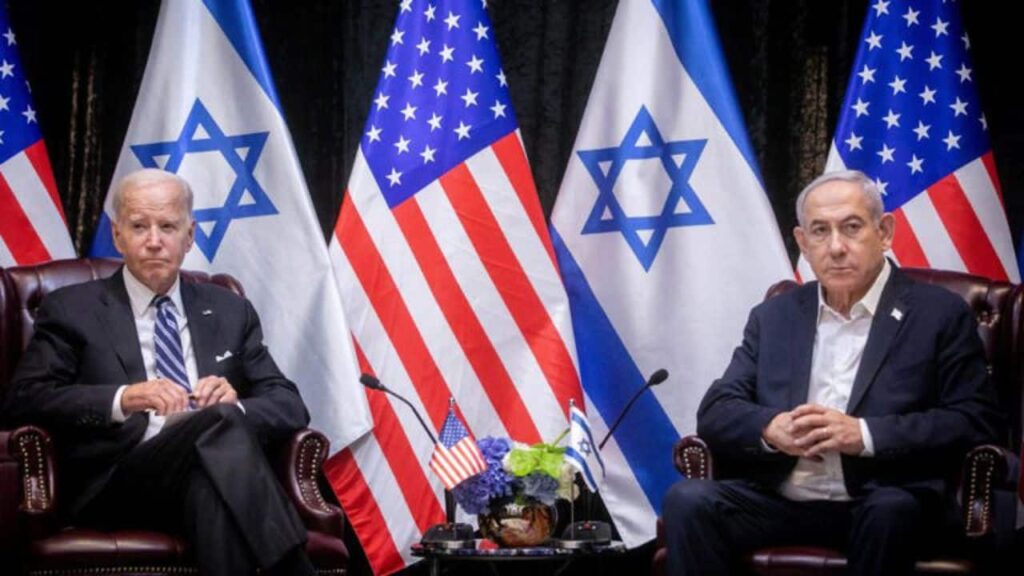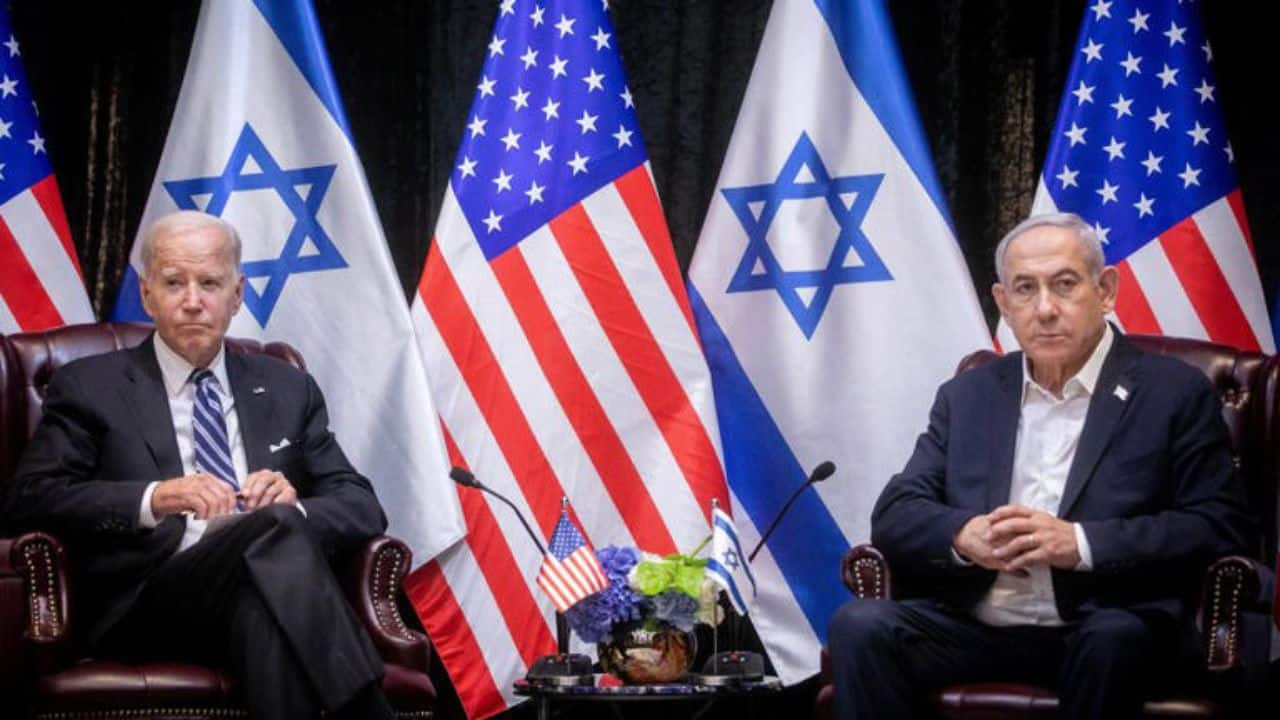Biden Netanyahu tensions, Israel Gaza conflict, hostage release talks, Hamas ceasefire, U.S.-Israel relations, Biden Netanyahu disagreement, Philadelphi corridor, Gaza negotiations, Biden on Netanyahu, Middle East diplomacy
Explore the growing tensions between U.S. President Joe Biden and Israeli Prime Minister Benjamin Netanyahu as they clash over ceasefire and hostage release negotiations with Hamas. This article delves into the complexities of their relationship, the ongoing Gaza conflict, and the critical diplomatic efforts to secure peace.

Biden and Netanyahu at Odds Again: Tensions Rise Over Ceasefire and Hostage Release Negotiations
The relationship between U.S. President Joe Biden and Israeli Prime Minister Benjamin Netanyahu has once again come under strain, as the two leaders find themselves at odds over the handling of ceasefire and hostage release negotiations with Hamas. The latest disagreement stems from President Biden’s assertion that Netanyahu is not doing enough to secure the release of hostages held by Hamas, a stance that has sparked further tensions between the long-standing allies.
The Hostage Crisis and the Gaza Conflict
The conflict between Israel and Hamas has been marked by intense violence and a significant loss of life, particularly following the October 7 attacks by Hamas, which escalated into full-scale warfare. Amidst the ongoing conflict, Hamas has taken hostages, including both Israeli and American citizens, leading to a complex and delicate situation that requires careful diplomatic maneuvering.
President Biden has been actively involved in efforts to negotiate a ceasefire that would include the release of these hostages. His administration has been working closely with international partners, including Qatar and Egypt, to broker a deal that would not only pause the fighting but also ensure the safe return of the hostages. However, the discovery of the bodies of six hostages, including Israeli-American citizen Hersh Goldberg-Polin, has added urgency and complexity to these negotiations.
Biden’s Criticism of Netanyahu
During a press interaction on Monday, President Biden expressed his frustration with Netanyahu’s approach to the negotiations, stating that the Israeli Prime Minister is not doing enough to reach an agreement that would secure the release of the hostages. This rare public criticism from Biden underscores the deep frustrations within the White House regarding Netanyahu’s handling of the situation.
Biden’s comments came as he returned to the White House for a meeting with American officials who have been leading the negotiation efforts. Vice President Kamala Harris also attended the meeting, reflecting the high-level attention the issue is receiving within the U.S. administration.
A senior Israeli source responded to Biden’s remarks, expressing surprise that the U.S. President would pressure Netanyahu rather than focusing on Hamas leader Yahya Sinwar, who has been resistant to making any concessions. The source emphasized that Netanyahu had already agreed to previous proposals put forth by the U.S., suggesting that the onus should be on Hamas to show seriousness in the negotiations.
A Long-Standing but Strained Relationship
The relationship between Biden and Netanyahu is long and complex, characterized by both cooperation and tension over the years. While the two leaders have worked together on various issues, their differing approaches to the Israeli-Palestinian conflict have often led to disagreements.
Biden’s recent comments are a reflection of the growing discord between the two leaders, particularly in the context of the ongoing Gaza conflict. The U.S. President has been careful in his public criticism of Netanyahu, but his one-word response on Monday—”No”—when asked if Netanyahu was doing enough, speaks volumes about the underlying frustrations.
Netanyahu’s Defense and the Stalemate
In response to Biden’s remarks, Netanyahu held a press conference where he defended Israel’s position in the negotiations. He argued that Israel had shown seriousness in the talks and had already made significant concessions. Netanyahu pointed out that Hamas had not reciprocated, instead resorting to further violence, including the execution of six hostages.
Netanyahu questioned the logic of asking Israel to make additional concessions in light of Hamas’s actions, arguing that such a move would only encourage further violence. He reiterated that international pressure should be directed at Hamas, which he described as responsible for the ongoing bloodshed.
The Israeli Prime Minister also highlighted a shift in the negotiations concerning the Philadelphi corridor, a strip of land along the Egypt-Gaza border. Initially, Israel had agreed to a U.S. proposal that envisioned a withdrawal of Israeli Defense Forces (IDF) from populated areas in Gaza. However, recent developments have seen Israel insist on maintaining a presence in the Philadelphi corridor, a stance that has complicated the negotiations.
The Role of International Mediators
As the situation unfolds, international mediators, including officials from Qatar and Egypt, have been working tirelessly to push forward the ceasefire and hostage release deal. The discovery of the executed hostages has added pressure on all parties involved, but it has also raised doubts about Hamas’s commitment to reaching a deal.
Mossad Director David Barnea’s visit to Doha for discussions with Qatari Prime Minister Mohammad Abdulrahman Al Thani highlights the critical role that Qatar is playing in these negotiations. Qatar has historically acted as an intermediary between Hamas and other parties, given its influence and connections within the region.
However, Netanyahu’s insistence on retaining control of the Philadelphi corridor has emerged as a significant obstacle. Hamas negotiators have made it clear that any deal would require an IDF withdrawal from this area, further complicating an already fraught negotiation process.
U.S. Position on Gaza’s Future
The U.S. administration, led by President Biden and Secretary of State Antony Blinken, has made it clear that it does not support a long-term Israeli occupation of Gaza. Blinken, during his recent visit to Israel, reiterated that the U.S. expects Israel to fully withdraw from Gaza as part of any permanent ceasefire agreement.
This position is in stark contrast to Netanyahu’s recent demands regarding the Philadelphi corridor, indicating a potential clash between U.S. and Israeli objectives in the region. The U.S. sees the withdrawal as essential to achieving a sustainable peace, while Netanyahu views the corridor as crucial to Israel’s security.
The Path Forward: Uncertain and Fraught with Challenges
As President Biden and Prime Minister Netanyahu continue to navigate these complex negotiations, the path forward remains uncertain. The deaths of the hostages and the ongoing conflict in Gaza have heightened the stakes, making it imperative for both leaders to find common ground.
Biden’s statement that a final deal is “close” offers a glimmer of hope, but the underlying tensions between the U.S. and Israeli positions suggest that significant challenges remain. The involvement of international mediators, the shifting dynamics within the negotiations, and the differing priorities of the U.S. and Israel all contribute to the complexity of the situation.
Conclusion: A Delicate Balancing Act
The strained relationship between President Joe Biden and Prime Minister Benjamin Netanyahu reflects the broader challenges of navigating the Israeli-Palestinian conflict. As the two leaders work to secure a ceasefire and the release of hostages, their differing approaches and priorities have come to the fore.
The ongoing negotiations are a delicate balancing act, requiring both diplomacy and strategic concessions. While the U.S. seeks to broker a deal that ensures peace and the safe return of hostages, Israel is focused on maintaining its security and preventing further violence from Hamas.
The coming days and weeks will be crucial in determining the outcome of these negotiations. Whether Biden and Netanyahu can bridge their differences and achieve a lasting solution remains to be seen. However, what is clear is that the stakes are high, and the world is watching as these two leaders work to navigate one of the most challenging crises of their respective tenures.
Read More
